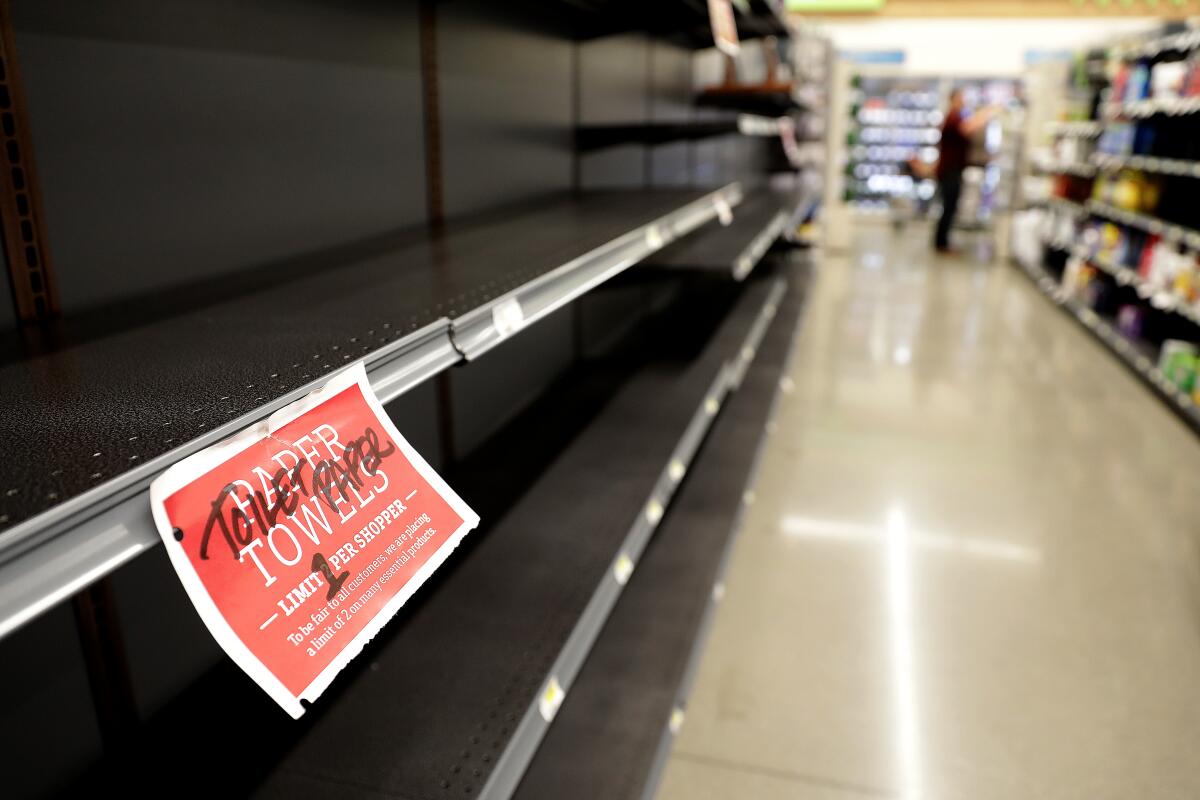Newsletter: What if we all got a coronavirus check and had nowhere to spend it?

- Share via
I’m Business columnist David Lazarus, with a look today at the central role consumers play in getting us through the coronavirus pandemic.
As political leaders scramble to cushion the economic blow of the coronavirus outbreak, with measures ranging from sending everyone a check to bailing out struggling industries, the Achilles heel of all these plans is the fact that consumer spending accounts for about two-thirds of total U.S. economic activity.
Which is to say, if consumers don’t spend, the economy grinds to a halt.
This makes any recovery plan unusually tricky because most people have been told to stay home (and hopefully out of harm’s way), and many businesses have closed their doors or cut back service until the outbreak subsides.
The risk from a policy-making perspective is that no matter how cash is funneled to consumers, they may either stash it under their mattresses or have nowhere to spend it. That, in turn, would make it even harder for many businesses to stay afloat, which would lead to further layoffs and, well, nothing good.
In an editorial last week, the L.A. Times urged people to keep money circulating as best they can.
“Continue to pay your house cleaner, dog walker, personal trainer and the rest of the people whose services make your life a little easier, even if you don’t use them for a few weeks,” it said. “Why? Because many of these folks are self-employed, and they lack the support systems that others of us may have. If they don’t work, they don’t get paid. But they still have to pay the bills.”
That’s good advice, and a good way to demonstrate an awareness that we’re all in this together.
Some other consumer-related coronavirus tidbits to keep in mind:
- You may have some wiggle room on paying your credit card bills. Contact your issuer about extending payment deadlines, waiving late fees or even lowering your annual percentage rate. Card companies are aware that partial payments are better than no payments at all.
- Power and water utilities are similarly showing flexibility with unpaid bills. Many are offering extended payment plans to beleaguered customers and pledging not to cut service if a monthly bill is missed.
- Los Angeles is poised to adopt a temporary ban on evictions and foreclosures, and could require landlords and residential mortgage-holders to work out payment plans with affected residents.
- The federal income tax filing date has been pushed to July 15 from April 15. California announced a similar move regarding state taxes.
If you’re stuck at home with nothing to do, Sling TV is offering free streaming service to anyone who wants to catch some online TV shows, movies and news broadcasts. Starz is pitching a deep discount on its streaming service.
Along those same lines, European authorities urged Netflix and other streaming platforms to switch from high-definition broadcasts to standard definition to keep the overburdened internet from breaking. Netflix said it would reduce picture quality for 30 days. Amazon followed suit for its Prime Video service.
If the same happens here, consider it one more sacrifice we all have to make during a national emergency.
Enjoying this newsletter? Consider subscribing to the Los Angeles Times
Your support helps us deliver the news that matters most. Become a subscriber.
A couple of other recent coronavirus stories from our pages worth highlighting (collect them all):
Economic fallout: Stocks have collapsed, airlines shed routes and businesses have closed. Millions of workers are being sent home and cautioned to minimize their interactions with their friends, neighbors and even family members. Just how much sheltering in place can the economy take?
Job losses: Workers across vast swaths of the Golden State’s labor market are feeling the pain amid the coronavirus pandemic. Wealthy, poor and levels in between. Young, old and middle-age. Some are in free-fall. Others have safety nets. But for all, the losses are sudden and staggering.
Recalls
In case you’re figuring you can protect yourself from a coronavirus power outage by purchasing a portable generator, heads up: Honda is recalling about 340,000 portable generators because of a fire hazard.
Volvo is recalling several model lines because the automatic emergency braking system may not detect obstacles and stop as intended. The recall, involving more than 120,000 vehicles, covers 2019 and 2020 S60, V60, S90L and V90 models.
Spare change
Since sickness remains at the forefront of most people’s minds, here are some TV commercials from a kinder, gentler age. Headache? Try Liquid Peptans. Or Vanquish capsules. Coughing? There’s Arrestin, which contains a “new medical cough suppressant.” And don’t rule out Teek. It has TC-44!
Stay in touch
Let me know what you think of the newsletter. My email is david.lazarus@latimes.com, or you can find me on Twitter @Davidlaz. Also, tell all your pals to join the party.
Until next time, see you in the Business section.
Inside the business of entertainment
The Wide Shot brings you news, analysis and insights on everything from streaming wars to production — and what it all means for the future.
You may occasionally receive promotional content from the Los Angeles Times.




